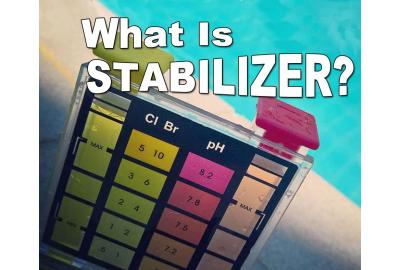Regardless of how much you know about pool chemistry, you've likely heard the words "conditioner" or “stabilizer” before. But exactly what are these terms referring to? Moreover, what do conditioners and stabilizers have to do with the health of your pool? The short answer is: quite a bit. In fact, stabilizers like cyanuric acid have the power to affect nearly every aspect of your pool’s chemical levels. This means that it can have widespread repercussions for both the overall health of your pool, and – by extension – your wallet. Stabilizers are important to every swimming pool whether it's an inground or an above ground pool.
What Exactly is Stabilizer?
Cyanuric Acid (CYA) is used in pools to provide insulation from UV rays. That's right - stabilizers are actually designed to protect your pool from the sun. You see, when UV rays hit the water, the chlorine levels in your water start to drop due to evaporation. So, if you aren't checking your chemical levels often enough, this lowered chlorine concentration can lead to all sorts of problems. In this article, we'll discuss the importance of using a stabilizer in your pool, as well as what can go wrong without it.
Stabilizer Protects Chlorine Levels
As we said, a stabilizer's primary function is to maintain the chlorine level of your pool by protecting against UV rays. Should evaporation cause your pool's free chlorine levels to drop suddenly, you may need to "shock" your pool with high levels of chlorine to make the water healthy again. Shocking your pool takes time, money, and effort. And the last thing you want to do is take any days out of summer rehabbing your pool water. However, if you keep your stabilizer levels up to par, you can protect your chlorine levels and ensure you squeeze every hour of fun out of your pool.
Stabilizer Prevents Algae Blooms
It’s happened to more pool owners than they can count. They don’t use their pool for a few days, perhaps a week, and walk out into the yard to find their water infested with leafy green algae. Again, this is evidence that your sanitizer levels have dropped low enough to allow most of your free chlorine to evaporate. Of course, dealing with algae is an altogether different problem. I'm talking about brushing, filter cleaning, shocking, and purchasing expensive algae treatments. To make matters worse, it might be days of backbreaking work before you get to take a dip in your pool again.
Stabilizer Saves You Money
Pools are not cheap to own when they're working properly. So when something goes wrong, you might find yourself running back in forth to your pool supply store, trying to find the right solution to your problem. From extra chlorine tablets to shock treatments and algaecides, getting your pool back in shape will likely cost you a pretty penny. Had you simply maintained healthy stabilizer levels, you could put that money toward new pool toys instead.
Stabilizer Gives Your More Time to Enjoy Your Pool
Your stabilizer works 24/7 for you and your pool. In the end, this adds up to loads of saved time and reduced maintenance. On top of that, your stable pool will be much easier to brush, filter, and winterize, which means less work and more fun. By monitoring your stabilizer levels once a week, you can avoid catastrophe, save cash, and get more quality time in the pool with your friends and family. If you have any questions about water chemistry or above ground pools call us at (866) 534-9725 or visit our website at https://www.poolsaboveground.com/







